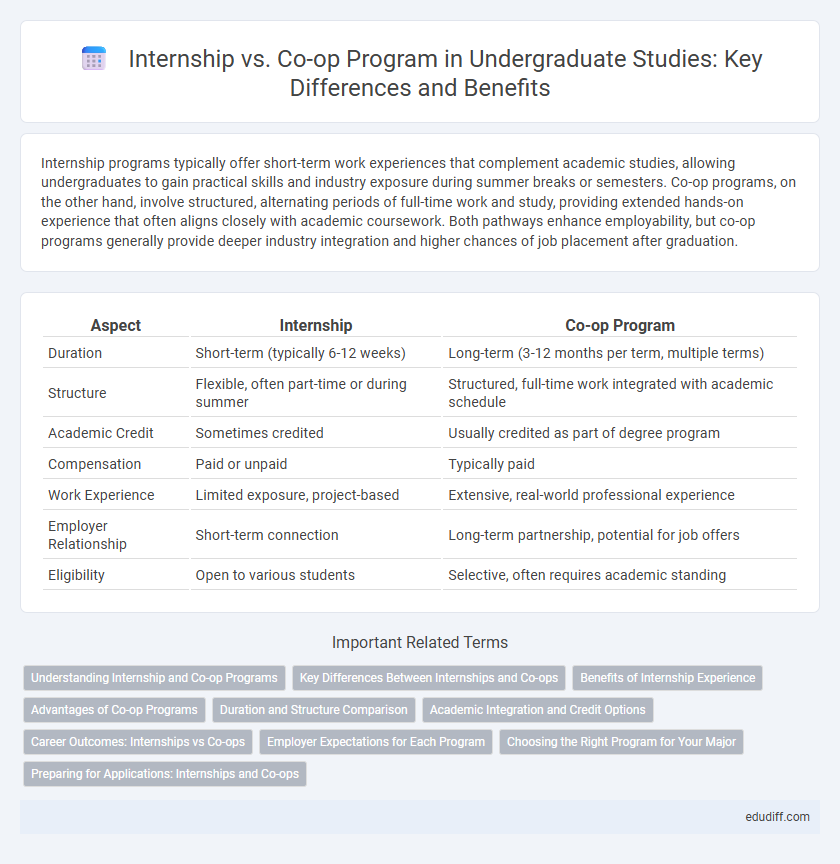Internship programs typically offer short-term work experiences that complement academic studies, allowing undergraduates to gain practical skills and industry exposure during summer breaks or semesters. Co-op programs, on the other hand, involve structured, alternating periods of full-time work and study, providing extended hands-on experience that often aligns closely with academic coursework. Both pathways enhance employability, but co-op programs generally provide deeper industry integration and higher chances of job placement after graduation.
Table of Comparison
| Aspect | Internship | Co-op Program |
|---|---|---|
| Duration | Short-term (typically 6-12 weeks) | Long-term (3-12 months per term, multiple terms) |
| Structure | Flexible, often part-time or during summer | Structured, full-time work integrated with academic schedule |
| Academic Credit | Sometimes credited | Usually credited as part of degree program |
| Compensation | Paid or unpaid | Typically paid |
| Work Experience | Limited exposure, project-based | Extensive, real-world professional experience |
| Employer Relationship | Short-term connection | Long-term partnership, potential for job offers |
| Eligibility | Open to various students | Selective, often requires academic standing |
Understanding Internship and Co-op Programs
Internship and co-op programs provide undergraduate students with valuable work experience, enhancing practical skills and industry knowledge. Internships typically offer short-term, flexible opportunities often completed during summer breaks, while co-op programs involve longer, structured work terms integrated into the academic curriculum. Understanding the differences allows students to choose the best option for gaining relevant experience and improving career prospects.
Key Differences Between Internships and Co-ops
Internships typically last a few months, often during summer, offering short-term work experience related to a student's field of study, while co-op programs integrate multiple paid work terms throughout the academic curriculum, providing extended professional training. Internships may be part-time or full-time and are generally more flexible, whereas co-op positions require a structured alternation between academic semesters and work terms, often resulting in a longer graduation timeline. Employers use internships to assess candidates' skills quickly, while co-op programs emphasize continuous skill development and deeper industry engagement over multiple work periods.
Benefits of Internship Experience
Internship programs provide undergraduates with practical work experience that enhances their resumes and develops industry-relevant skills. Internships offer flexible, short-term opportunities to explore career interests and build professional networks before graduation. The hands-on experience gained through internships increases employability by demonstrating real-world application of academic knowledge to potential employers.
Advantages of Co-op Programs
Co-op programs offer undergraduates extended, paid work experiences that integrate academic learning with practical industry skills, enhancing employability and professional networking. Unlike internships, co-ops provide structured, multi-semester placements that foster deeper skill development and real-world problem solving within a collaborative work environment. These programs also improve time management and adaptability while often leading to higher post-graduation job placement rates.
Duration and Structure Comparison
Internship programs typically last between 8 to 12 weeks during the summer, offering short-term, project-based work experiences that complement academic learning. Co-op programs extend over multiple semesters, often ranging from 4 to 12 months per term, integrating alternating full-time employment with academic study for deeper professional development. The structured rotation in co-op placements usually mandates participation in several work terms, providing extended industry exposure compared to the time-limited nature of most internships.
Academic Integration and Credit Options
Internship programs typically offer flexible academic integration with options for elective or pass/fail credits, allowing students to gain practical experience without a heavy impact on their GPA. Co-op programs are structured to provide full academic credit that directly fulfills degree requirements, often involving alternating semesters of work and study. This integration ensures co-op students earn substantial academic recognition while gaining professional experience closely aligned with their curriculum.
Career Outcomes: Internships vs Co-ops
Internships typically offer short-term, project-based work experience that enhances specific skills and builds professional networks, often leading to summer job offers or entry-level positions. Co-op programs integrate multiple paid work terms directly into the academic curriculum, providing extended industry exposure and a deeper understanding of career paths, which significantly improves job placement rates and starting salaries. Data from the National Association of Colleges and Employers (NACE) shows that co-op participants have a 30% higher chance of receiving full-time job offers from their employers compared to interns.
Employer Expectations for Each Program
Employers expect interns to quickly adapt and contribute to short-term projects while gaining hands-on experience relevant to their academic studies. Co-op programs demand a higher level of commitment, with employers anticipating long-term involvement, advanced skill application, and meaningful contributions to core business operations. Both programs require strong communication skills, professionalism, and a proactive attitude toward learning and problem-solving in a real-world environment.
Choosing the Right Program for Your Major
Selecting the appropriate experiential learning program depends on your major's requirements and career goals, as internships typically offer short-term, skill-specific experiences while co-op programs provide extended, paid work terms integrated with academic schedules. STEM majors often benefit from co-ops due to the hands-on industry exposure and networking opportunities, whereas humanities and social sciences students might find internships more flexible and aligned with exploratory career paths. Evaluating program duration, compensation, and alignment with your academic curriculum ensures the chosen option maximizes professional growth and employability post-graduation.
Preparing for Applications: Internships and Co-ops
Preparing for applications in internships and co-op programs involves tailoring resumes and cover letters to highlight relevant skills and experiences specific to the industry. Researching company requirements and deadlines increases the chances of securing a position aligned with academic and career goals. Networking through university career centers and professional events enhances access to exclusive opportunities and insider information.
Internship vs Co-op program Infographic

 edudiff.com
edudiff.com